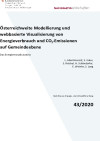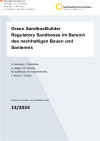Suchergebnisse
Green SandboxBuilder - Regulatory Sandboxes im Bereich des nachhaltigen Bauen und Sanierens
Im Projekt "Green SandboxBuilder" wurde erstmals in Österreich der Bedarf an Regulatory Sandboxes für ökologisch nachhaltige und klimawirksame Vorhaben im Baubereich systematisch erhoben. Die Umsetzung von Regulatory Sandboxes im österreichischen Bausektor kann dazu beitragen, die Einführung von technologischen, prozessualen und sozialen Innovationen entscheidend zu beschleunigen und somit die Nachhaltigkeitsziele zu erreichen.
Green SandboxBuilder - Regulatory sandboxes in the field of sustainable construction and renovation
In the "Green SandboxBuilder" project, for the first time in Austria, the need for regulatory sandboxes for ecologically sustainable and climate-effective projects in the building sector had been systematically explored. The implementation of regulatory sandboxes in the Austrian construction sector can contribute to decisively accelerating the introduction of technological, procedural and social innovations and thus to achieving the sustainability goals.
BIMSavesEnergy - BIM-basierte Planungsmethoden zur Sicherstellung von Energie-effizienz im Bauprozess
Das Building Information Model (BIM) bewirkt grundlegende Veränderungen in Planung und Bau von Gebäuden, da durch die gemeinsame Datenbasis erstmals eine enge, organisationsübergreifende Zusammenarbeit in Bauprojekten möglich wird. In diesem Projekt wurden BIM-basierte Planungsmethoden entwickelt, die den Einfluss von Planungsentscheidungen auf die Energieeffizienz quantitativ bewertbar und im Managementprozess steuerbar machen.
Housing 4.0 - digital platform for affordable living
The main aim of this project is the development of an integrated framework for the digital platform "Housing 4.0"; thus supporting integrated planning and project delivery through coupling various digital tools and databases. Thereby, the potentials of BIM for modular, off-site housing assembly in order to improve planning and construction processes, reduce cost and construction time and allow for mass customization will be explored. The novel approach in this project is user-involvement; which has been neglected in recent national and international projects on off-site, modular construction, supported by digital technologies.
WOHNEN 4.0 - Digitale Plattform für leistbares Wohnen
Im vorliegenden Forschungsvorhaben wurde das Rahmenwerk für die digitale Plattform "Wohnen 4.0" entwickelt, welche durch eine Parameter-Datenbank und Koppelung digitaler Werkzeuge die integrale Projektabwicklung unterstützt. Der Fokus lag dabei auf der Entwicklung und Nutzung von BIM-Objektbibliotheken für die modulare Off-Site Produktion im Geschoßwohnbau. Erstmalig wurden auch Nutzer:innen beteiligt und dadurch der zunehmend wichtiger werdende Aspekt der Partizipation integriert.
Energiemosaik Austria - Österreichweite Modellierung und webbasierte Visualisierung von Energieverbrauch und CO2-Emissionen auf Gemeindeebene
Inhalt des Projektes ist eine alle Nutzungs- und Mobilitätsarten umfassende Modellierung und webbasierte Visualisierung von Energieverbrauch und Treibhausgasemissionen aller österreichischen Gemeinden. Die Ergebnisse können in zahlreiche energie- und klimarelevante Handlungsfelder integriert und für die Sensibilisierung von Entscheidungsträgern und Öffentlichkeit genutzt werden.
M-DAB2: Materialintensität der Innenentwicklung - Ressourcenbewertung und Lokalisierung städtischer Entwicklungspotenziale
Bei der Bewertung von Innenentwicklungspotenzialen wurde erstmals auch die Materialintensität der Innenentwicklung (anfallende Stoffmengen) für unterschiedliche Entwicklungsvarianten berücksichtigt. Dabei wurde ein Methodenset zur holistischen Bewertung von Potenzialflächen und verschiedene Entwicklungsvarianten und -szenarien zur ressourcenschonenden Innenentwicklung geschaffen.
Energiemosaik Austria - Österreichweite Modellierung und webbasierte Visualisierung von Energieverbrauch und CO2-Emissionen auf Gemeindeebene

Inhalt des Projektes ist eine alle Nutzungs- und Mobilitätsarten umfassende Modellierung und webbasierte Visualisierung von Energieverbrauch und Treibhausgasemissionen aller österreichischen Gemeinden. Die Ergebnisse können in zahlreiche energie- und klimarelevante Handlungsfelder integriert und für die Sensibilisierung von Entscheidungsträgern und Öffentlichkeit genutzt werden.
Schriftenreihe
43/2020
L. Abart-Heriszt, S. Erker, S. Reichel, H. Schöndorfer, E. Weinke, S. Lang
Herausgeber: BMK
Deutsch, 56 Seiten
Downloads zur Publikation
Green SandboxBuilder: Regulatory Sandboxes im Bereich des nachhaltigen Bauens und Sanierens

Im Projekt "Green SandboxBuilder" wurde erstmals in Österreich der Bedarf an Regulatory Sandboxes für ökologisch nachhaltige und klimawirksame Vorhaben im Baubereich systematisch erhoben. Die Umsetzung von Regulatory Sandboxes im österreichischen Bausektor kann dazu beitragen, die Einführung von technologischen, prozessualen und sozialen Innovationen entscheidend zu beschleunigen und somit die Nachhaltigkeitsziele zu erreichen.
Schriftenreihe
13/2024
G. Leimüller, J. Rohrhofer, A. Gerger, Ch. Schranz, M. Aichholzer, M. Schachenhofer, C. Benes, F. Ozclon
Herausgeber: BMK
Deutsch, 71 Seiten
Downloads zur Publikation
3D*3B - 3D-Betondruck und Bewehrung für emissionsarme biegebeanspruchte Tragstrukturen des Hochbaus
Interdisziplinäres Projekt zur Integration von 3D-Betondruckelementen in vorwiegend biegebeanspruchte Tragstrukturen mit dem Ziel der nachweisbaren Reduktion von klimarelevanten Emissionen im Baubereich. Die Ergebnisse dienen der umfassenden Beurteilung technischer, logistischer und klimarelevanter Aspekte.
3D*3B - 3D-Concret Printing, Reinforcement for low carbon and bending stressed structures.
The project is about 3D printed structural elements and their integration in building structures. The focus is predominantly set on bending stresses structural elements like panels and slabs. Results will point out technical, logistic and climate relevant aspects.
VR4UrbanDev - Virtual Reality als innovatives, digitales Werkzeug für die integrative Stadtentwicklung der Zukunft
Virtuelle Realität (VR) hat das Potential komplexe Sachverhalte schneller erfassbar und direkt erfahrbar zu machen. Im Projekt VR4UrbanDev nutzen wir dieses Potential für energietechnische Planungsprozesse von Gebäuden und Stadtquartieren. Anhand von Testarealen werden wir Methoden entwickeln, um in der VR-Umgebung energietechnische Echtzeitdaten und Simulationsdaten einspielen, sowie visualisieren zu können.
VR4UrbanDev - Virtual Reality as an innovative, digital tool for the integrative urban development of the future
Virtual reality (VR) has the potential to make complex issues more quickly comprehensible and directly tangible. In the VR4UrbanDev project, we are using this potential for energy planning processes for buildings and urban districts. On the basis of test areas, we develop methods for importing and visualising energy-related real-time data and simulation data in the VR environment.
openBAM - Open Building Automation Modelling - Offene Modellierung der Gebäudeautomation über den gesamten Gebäudelebenszyklus
Plattform-unabhängige Modellierung der Steuerungs- und Regelungslogik zur detaillierten Untersuchung von Gebäudeautomationssystemen mit Bautechnik und Gebäudetechnik. Das Ergebnis ermöglicht es, Energieeinsparungspotenziale durch Gebäudeautomation schon vor der Ausführung digital zu analysieren.
openBAM - Open Building Automation Modelling - Open modeling of building automation over the entire building life cycle
Platform-independent modeling of control and regulation logic for detailed study of building automation systems involving construction and building technology. The result enables the analysis of energy saving potentials through building automation before construction.
BIM2BEM Flow - Kontinuierliche, BIM-basierte Energieeffizienzplanung
Durch eine automatisierte Integrierung und Zuweisung der Austauschanforderungen zwischen Entwurfs- und Simulationsprogramm anhand der ausgearbeiteten Austauschinformationsanforderungen soll eine kontinuierliche Energieeffizienzplanung entlang der Entwurfsphase ermöglicht werden.
BIM2BEM Flow - Continuous BIM-based energy efficient planning
Automated integration and assignment of exchange requirements between the design and simulation programs, based on the elaborated exchange information requirements, should enable continuous energy efficiency planning along the design phase.
